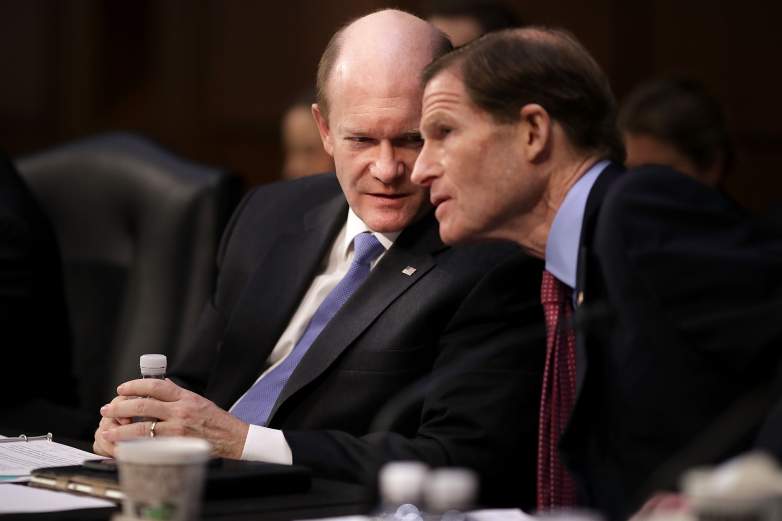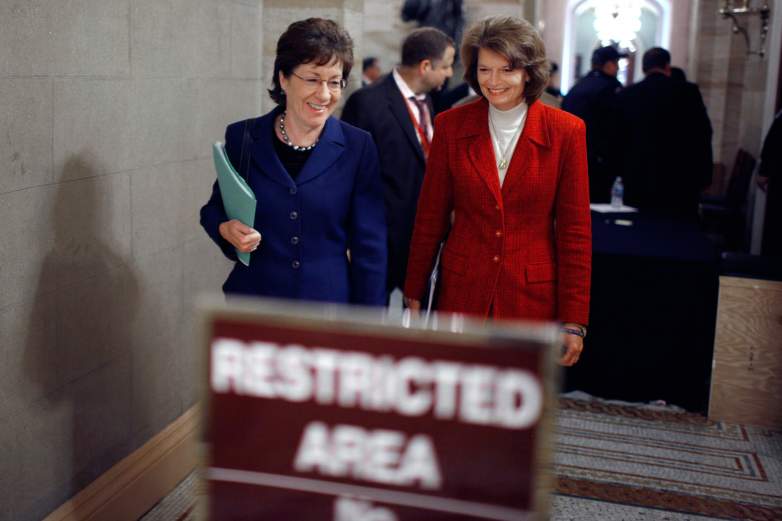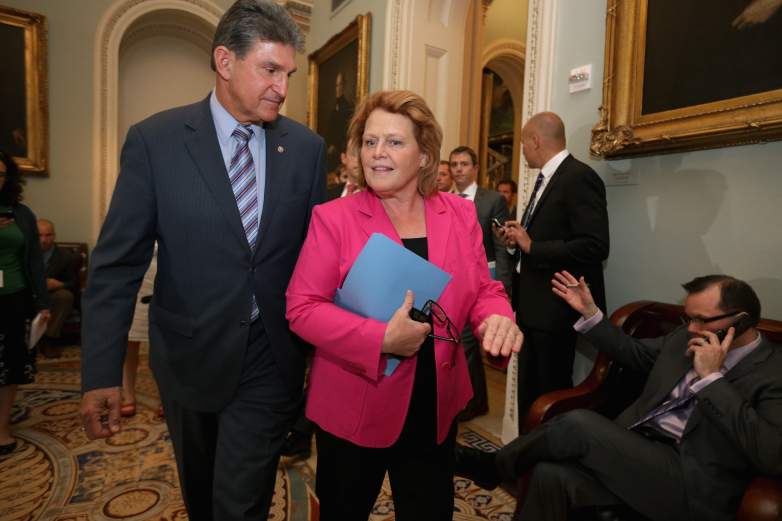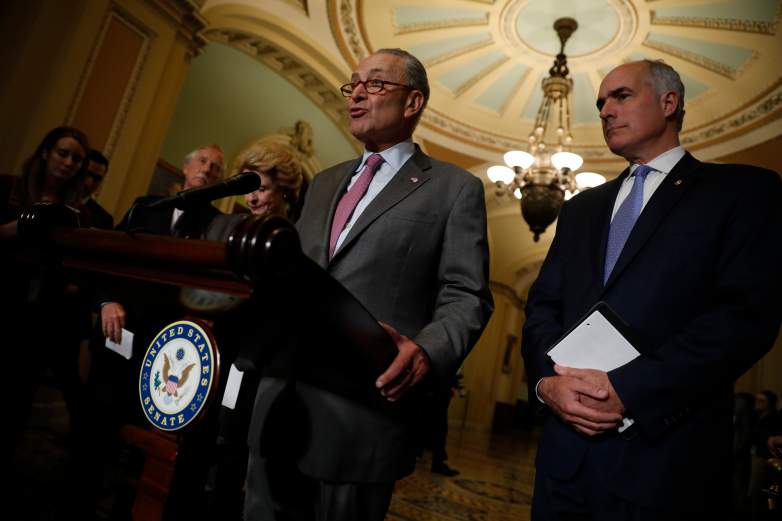
Getty President Donald Trump greets Senate Minority Leader Chuck Schumer while Senate Majority Leader Mitch McConnell looks on.
The Democrats are preparing to fight President Donald Trump’s nominee to replace Justice Anthony Kennedy on the Supreme Court, but it is likely a battle that they cannot win.
Kennedy, a longtime swing justice, announced his retirement last month and Trump is planning to announce his nominee to replace him Monday night while Republicans plan to attempt to have the nominee confirmed before the midterm elections in November. While the Democratic base is clamoring for their Senators to stop Trump’s nomination, the numbers and procedures to do so are not likely there.
“The grim reality is that we have some power but not the power to stop this,” Democratic Senator Dick Durbin, of Illinois, told The New York Times. “I’m sure many of them believe we have the power to stop this.”
Can the Democrats stop President Trump’s Supreme Court nomination? Here’s what you need to know:
The Numbers Are Not in the Democrats Favor
Republicans hold a 51-49 advantage in the Senate, and can break a tie with Vice President Mike Pence’s vote. When President Barack Obama nominated Judge Merrick Garland to replace Justice Antonin Scalia, Senate Majority Leader Mitch McConnell was able to stop the nomination and push the process off until after the presidential election because he held a numbers advantage. Senate Minority Leader Chuck Schumer doesn’t have that advantage.
The Democrats used the filibuster to try to stop Neil Gorsuch’s confirmation, meaning that option is also off the table, eliminating the requirement that a Supreme Court nominee must receive a supermajority of 60 votes to be confirmed. Democrats will need to turn the public opinion against the nominee if they have any chance of stopping him or her from being confirmed.
“Conventional wisdom said that the resistance didn’t stand a chance to defeat Trumpcare. But we fought and we won,” a resistance group, the Indivisible Project, wrote in an email to its members, according to Vice. “There’s a similarly narrow pathway to victory to save the Supreme Court.”
Senator Chris Coons, a Delaware Democrat who sits on the Judiciary Committee, said on CBS’s “Face the Nation,” on Sunday, “It will be very difficult. If all the Republicans stick together, along with the vice president, they’ll be able to confirm whomever President Trump nominates.”

GettyDemocratic Senators Chris Coons and Richard Blumenthal.
Minnesota Senator Amy Klobuchar, another Democratic member of the Judiciary Committee, told The New York Times, “The key is to not give up here. We need to make the case to the American people about how the decisions that this court makes every day affect people’s lives. Look at the last decades: where you can go to school, who you can marry, how you can vote, if you can vote. Those are the kinds of decisions they make.”
Schumer, his fellow liberal senators and Democratic activists hope to make the Supreme Court battle one focused on two issues, abortion and health care.
“Let this be a call to action, for Americans from all corners of the country, to rise up and speak out,” Schumer told The Times. “Don’t let this new court, this new nominee, whomever he or she may be, turn back the clock on issue, after issue, after issue.”
Democrats also are trying to argue that the nominee should not be confirmed until after the midterm elections in November, since McConnell and the Republicans delayed the vote on Scalia’s replacement until after Trump was elected.
“Elections are elections,” Democratic Senator Dianne Feinstein, of California, told The Times. “The shock that the Republican majority would remove from the fourth year of the president of the United States his ability to appoint a Supreme Court justice was very high. For us on this side it was a humiliation. And it is carved deep into our memory.”
But McConnell has fought back against that argument, telling reporters, “These aren’t the final months of a second-term, constitutionally lame-duck presidency with a presidential election fast approaching. We are right in the middle of this president’s first term. To my knowledge, nobody on either side has ever suggested before yesterday that the Senate should only process Supreme Court nominations in odd-numbered years.”
The Democrats Best Hope Is to Flip a Moderate Republican While Also Keeping Their Own Red-State Senators in Line

Senators Susan Collins and Lisa Murkowski.
Democrats will look to take to the streets, holding protests and rallies and trying to influence those senators into voting against the nominee by convincing them that a vote to confirm would put Roe v. Wade at risk and also possibly lead to decisions that limit public healthcare options.
With Senator John McCain battling cancer in Arizona and unlikely to return to Washington, D.C. for the confirmation vote, the Republicans can’t afford a defection.
If the Democrats are able to win a public opinion battle like in the healthcare debate, their hopes of blocking Trump’s nominee will likely hinge on five senators: two moderate Republicans, Susan Collins and Lisa Murkowski, who have spoken out about women’s rights and healthcare issues and three Democrats, Heidi Heitkamp, Joe Donnelly and Joe Manchin, who are up for re-election in November and are being targeted by the GOP.
Even if Democrats are able to convince Murkowski or Collins to vote no, the Republicans could still be able to get the nominee through by bringing Heitkamp, of North Dakota, Donnelly, of Indiana, or Manchin, of West Virginia, to their side. All three voted to confirm Gorsuch, breaking ranks with the Democrats.
Collins, of Maine, told ABC News, “A candidate for this important position who would overturn Roe v. Wade would not be acceptable to me, because that would indicate an activist agenda that I don’t want to see a judge have. What I want to see is a nominee who, regardless of his or her personal views on the very difficult and contentious life issue, is going to respect precedent.”
Murkowski, of Alaska, told The Associated Press she would cast an “independent vote,” saying in a statement, “My standards for Supreme Court nominees are extremely high. It is my longstanding practice to carefully scrutinize the qualifications of judicial nominees and to cast an independent vote when judicial nominations come before the Senate.”

Senators Joe Manchin and Heidi Heitkamp.
The three Democrats, meanwhile, have all called for a moderate candidate. Their party will have to work to paint the nominee as being an extremist and out-of-line with norms in order to guarantee the three vulnerable senators stay in line.
Donnelly, who opposes abortion rights except in cases of rape or incest or to save a mother’s life, told USA Today he met with Trump in the White House, and told him “‘Mr. President, we need you to select a moderate. Someone who is common sense, someone in the mold of Anthony Kennedy, because we need to bring our country together.'”
Heitkamp echoed those thoughts, telling USA Today, “I told the president that he has a chance to unite the country by nominating a true non-ideological jurist who could gain strong support from senators on both sides of the aisle, rather than create more divisions.”
Manchin said someone who was “hardcore on Roe v. Wade,” would be a “bigger lift” to confirm, according to The Hill. “I think he needs to get a jurist basically looking at the law. The Roe v. Wade has been the law for 40-some years,” Manchin said during a radio interview. A spokesperson for Manchin told USA Today that the senator sees healthcare as a bigger issue for the nominee, and said he didn’t want someone who had publicly opposed the Affordable Care Act.
Schumer is facing calls from the left to keep the three Democrats in line, but he has seemed hesitant to put the pressure on Manchin, Heitkamp and Donnelly, according to The Hill.
Quorum Breaking, Slowing the Process & Other Options Are Longshot Options

Senate Minority Leader Chuck Schumer, accompanied by Senator Bob Casey, at a press conference.
Senate Minority Leader Chuck Schumer and the Democratic leadership in the Senate will be left with only a few longshot options if they are not able to swing the votes to their side. But Vox says that Schumer has shied away from procedural options in the past. He told activists to, stop “prodding Democrats to use their limited procedural power to delay a Supreme Court confirmation,” ABC News reports.
According to Politifact, and extreme and untested option is quorum breaking, a strategy where Democrats would try to block a vote and delay the confirmation until after the midterm elections by hiding away from the Senate and preventing there from being 51 senators present for a quorum.
That strategy has worked on the state level, but never on the national level. And Senate Republicans could compel Democrats to come to the Senate through arrest. In 1988, a Republican senator, Bob Packwood, was carried into the chamber feet-first and against his will after Democrats ordered his arrest to maintain the quorum, according to Politifact.
If Democrats took that route, the Senate would essentially shut down, University of Miami political scientist Gregory Koger told Yahoo News. “The Senate can do nothing,” he said. “No bill can pass, no amendment can be decided on, no nominations can get approved.” Koger added, “This would be a confrontational tactic.”
According to the San Francisco Chronicle, another option some Democratic activists and politicians are calling for is to slow down the Senate process through several maneuvers in order to keep the confirmation from occurring until after the midterm elections, when Democrats could win back control of the chamber.
“In the Congress, there are many ways Democrats could gum up the works and really play hardball, as Republicans have been willing to do,” Eddie Kurtz, of the progressive California group Courage Campaign, told the Chronicle. “And outside, we can have the senators’ backs by making it crystal clear to the public what another right-wing justice would mean to the country on a wide range of issues.”
The Chronicle’s John Wildermuth writes, “There are plenty of ways Democrats could slow the already leisurely pace of the Senate, such as calling for a roll call vote on every issue, adding endless amendments to bills, pushing for extended debate, and even requiring the text of every amendment to be read out loud. But all those efforts would merely delay action on everything that moves through Congress. It would be an aggravation to Republicans, but they would eventually be able to get a nomination to the floor for a vote.”
Kurtz told the newspaper, “We might not win. But it isn’t impossible.”

